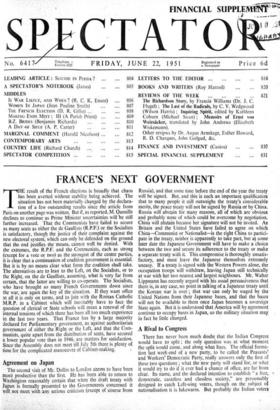Agreement on Japan
The second visit of Mr. Dulles to London seems to have been more productive than the first. He has been able to return to Washington reasonably certain that when the draft treaty with Japan is formally presented to the Governments concerned it will not meet with any serious criticism (except of course from Russia). and that some time before the end of the year the treaty will be signed. But, and this is such an important qualification that to many people it still outweighs the treaty's considerable merits, the peace treaty will not be signed by Russia or by China. Russia will abstain for many reasons, all of which are obvious and probably none of which could be overcome by negotiation. China will abstain because her signature will not be invited. As Britain and the United States have failed to agree on which China—Communist or Nationalist—is the right China to partici- pate in the treaty, neither is apparently to take part, but at some later date the Japanese Government will have to make a choice between the two and secure its adherence to the treaty or make a separate treaty with it. This compromise is thoroughly unsatis- factory, and must leave the Japanese themselves extremely uneasy. If a treaty is signed with the Western Powers alone. the occupation troops will withdraw, leaving Japan still technically at war with her two nearest and largest neighbours. Mr. Walter Lippmann has recently argued with his usual persuasiveness that there is, in any case, no point in talking of a Japanese treaty until the Korean war is over ; that war can only be waged by the United Nations from their Japanese bases, and that the bases will not be available to them once Japan becomes a sovereign State again. But it is understood that America will by agreement continue to occupy bases in Japan, so the military situation may in fact be little changed.


















































